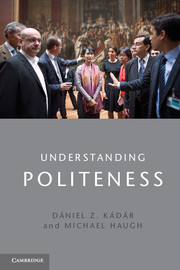Book contents
- Frontmatter
- Contents
- List of figures
- List of tables
- Foreword
- Acknowledgements
- 1 Introduction
- Part I Theoretical framework
- Part II Politeness and time
- Part III Politeness and social space: from mind to society
- 9 Politeness and metapragmatics
- 10 Politeness, cognition and emotion
- 11 Culture, identity and politeness
- 12 Conclusion
- Notes
- Glossary
- References
- Index
9 - Politeness and metapragmatics
Published online by Cambridge University Press: 05 June 2014
- Frontmatter
- Contents
- List of figures
- List of tables
- Foreword
- Acknowledgements
- 1 Introduction
- Part I Theoretical framework
- Part II Politeness and time
- Part III Politeness and social space: from mind to society
- 9 Politeness and metapragmatics
- 10 Politeness, cognition and emotion
- 11 Culture, identity and politeness
- 12 Conclusion
- Notes
- Glossary
- References
- Index
Summary
Introduction
Politeness is something that we can all talk and think about. This talk about politeness ranges from specific comments we might make to, or about, participants in interactions through to whole books on etiquette or appropriate social behaviour. Indeed, in some cultures we can find discourses on politeness and related phenomena stretching back thousands of years, a point we noted in Chapter 8. Such talk comes under the umbrella of metapragmatics, which can be broadly defined as the study of awareness on the part of ordinary or lay observers about the ways in which they use language to interact and communicate with others.
In order to start thinking about how we might study the metapragmatics of politeness, let us first consider example (1), from the movie Borat, where the British comedian Sacha Baron Cohen plays the character of Borat Sadiyev, a fictitious journalist from Kazakhstan who is travelling through the United States interacting with real-life Americans. Here, Borat is receiving instruction on how to act appropriately at a dinner party from a professional etiquette coach (Kathie). He then takes what he has ‘learned’ and subsequently applies it with members of a Dining Society at a dinner party in the Magnolia Springs Manor in Helena, Alabama. The participants in both of these interactions were not aware at the time that Borat was a fictional character being played by an actor.
- Type
- Chapter
- Information
- Understanding Politeness , pp. 181 - 206Publisher: Cambridge University PressPrint publication year: 2013



